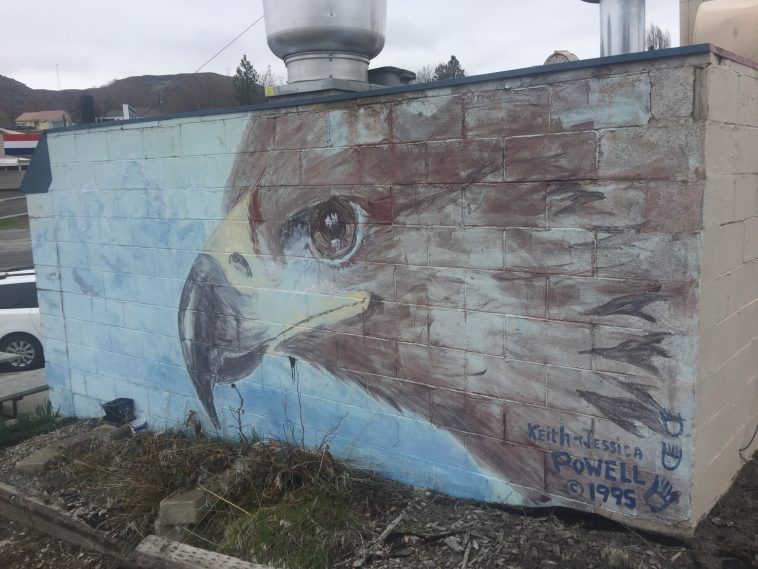The Apostrophe Blog
My poem, “Learning to See,” won Third Place in the Theme—Ekphrasis category of the Oregon Poetry Association’s Fall 2023 Contest. I wrote about this poem in a recent Apostrophe Blog post, explaining the concept of Ekphrastic Poetry and how I came to write this particular poem. As that post indicates, this poem was written in response to a photograph by Lucas DeShazer that I was assigned as part of project for the Inland Poetry Prowl held in Ellensburg, Washington back in April 2019.
I remember not liking the photo I was assigned one bit; I remember struggling to find my way into anything I could say in response to the image. Then I remembered that the Prowl itself was called “Sylvia’s Tulips”—many of the weekend events and readings were going to focus somehow on Sylvia Plath. That is when my poetry light bulb went on: I would find and start with a relevant line from one of Plath’s poems!
Lucky for me, Plath had once upon a time written a line about an eagle in her poem, “Gulliver.” This fortuity along with knowing that the photograph I had been assigned was of a diner in the town associated with the Grand Coulee Dam led me to further muse on notions such as stolen land, forced relocations, and cultural appropriation. It turns out there is more than enough (often damning) historical information about the dislocations and travesties that occurred when the United States government decided it had the right to displace indigenous people and their livelihoods to build a giant dam in the service of industry and progress.
After the Inland Poetry Prowl ended, I needed to see the mural I had written about for myself. So my husband and I did a road trip up to the town of Grand Coulee, Washington where the Tee-Pee Drive-In that boasted the eagle mural was now (not unexpectedly) closed. The image above was taken by me the day we visited. Later that day, we toured the dam itself.
My ekphrastic poem is below. It will be published in the Verseweavers anthology in early 2024. In addition to being a poem written in response to another work of art, it also uses the poetic device of anaphora for several stanzas—the repetition of a word or phrase at the beginning of successive clauses—to emphasize drama and heighten tension.
Jennifer Perrine, the judge for the Oregon Poetry Association Fall 2023 Ekphrasis category, had this to say about my poem: “‘Learning to See’ alludes to multiple artworks—a poem, a photograph, a mural—and distills them into a fierce litany of transformation. This poem becomes a kind of prayer for clarity, for an acknowledgment of history that others seek to erase, for an unblinking witnessing of contradictory truths.”
Learning to See
beginning with a line by Sylvia Plath
& in response to “Untitled 3,” Lucas DeShazer’s photograph
of a mural on the Tee Pee Drive-in, Grand Coulee, Washington
Let this eye be an eagle.
Let it eye me until I am off, taking wing in the distance, aloft.
Let it focus on turbines of guilt cascading over a dam, the revelries of flood.
Let it see the sign noting closed and the neon in the window contradict.
Let the door open with a toll and close with mere slaps on a hand.
Let me remember each teepee once housed a ritual fire of grease.
Let this eagle be an eye.
Let it strain to piercingly stare—down, at, into then across
The ravine of a bottomland, breached.
On this morning of wild snow gilding green leaves
When the fronds of the ferns are arrows of droop
While bulbs persist, shoot up, in spite of winter’s claw—
What the eagle-eyed have seen: the drowning of graves, the indigenous driven out.
Reclaim means retrieve, recover, bring (wasteland) under cultivation, reform.
Civilize. Tame.
Violence can be sputter on the grill, one steelhead flipped into a reservoir of loss.
Let this eagle be an eye caught in the eddies of ruthless
Disregard. A bird of prey. Unblinking.
- Of a Nineteenth Century Diaspora - January 15, 2026
- Feels Like A Year (Or Maybe a Century?) Lived in a Single Week - January 13, 2026
- Tis the Season… - December 22, 2025

